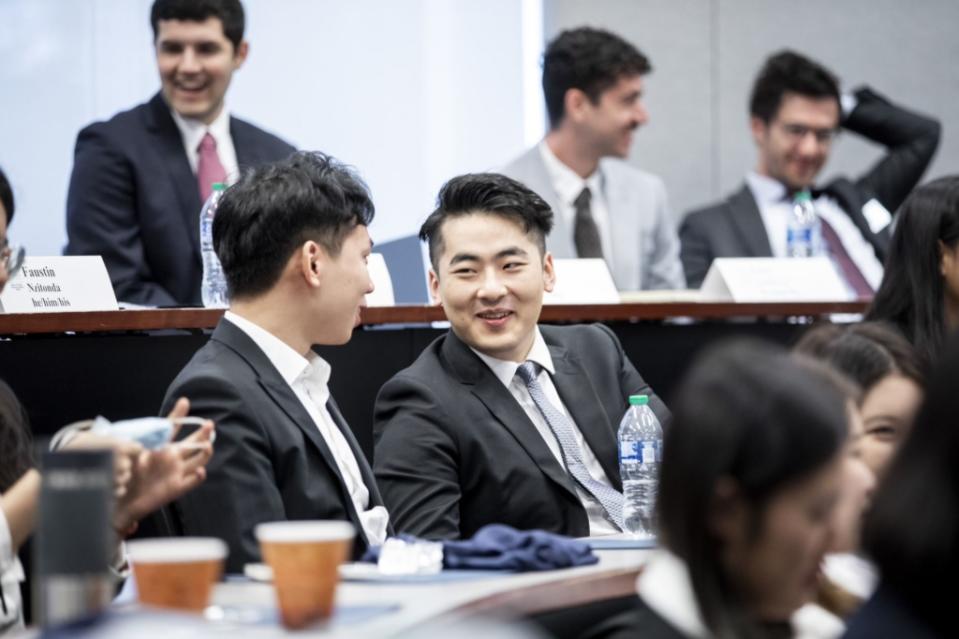[ad_1]

Ramnath Chellappa, professor of Information Systems & Operations Management, teaches a class at Emory’s Goizueta Business School. Goizueta is launching a new MS in Business Analytics for working professionals. Courtesy photo
Six years after launching its popular MS in Business Analytics, Emory University’s Goizueta Business School announced a new version geared to working professionals. Emory’s Master of Science in Business Analytics for Working Professionals (xMSBA) will welcome its first cohort in Fall 2023 with in-person and live virtual classes on weeknights and weekends.
The school is also introducing a new AI in Business track for students in the current full-time program.
“We have observed a need in the industry from current working professionals in the areas of business, technology, and data, and what we are offering is fundamentally different than other possibilities that these people have right now,” says Ramnath Chellappa, associate dean and academic director of Goizueta’s MSBA.
“Our xMSBA has been fine tuned to provide immediate benefits to how working professionals work in their organizations,” he tells Poets&Quants. “We hope that not only will individuals see this as an opportunity, but firms will see this as an opportunity to almost get free consulting from professors. It is their employees who are going to be solving these data problems.”
The xMSBA is geared to people with five or more years of work experience in business analytics or related fields and already possess basic data and programming skills. The goal is not only to upskill the students’ core abilities, but to also provide better understanding of how the advanced topics of machine learning, artificial intelligence, and cloud computing can be applied to problems their industry and company might face.

Ramnath Chellappa
In the program’s analytics practicum, students will work on a real data intensive business problem faced within their organizations.
“Firms that send employees will have the opportunity to unravel a particular real-world problem they’re facing, using their own data. Often, the legal teams at large organizations roadblock access to this proprietary data due to liability and intellectual property concerns. However, through the xMSBA, only the students from that firm will have access to the data, and they will be guided through the process by the expert hand of MSBA faculty members and Managing Director Scott Radcliffe,” says Chellappa.
Poets&Quants spoke with Chellappa, professor of Information Systems & Operations Management, about Goizueta’s new xMSBA and its new AI in Business track. Our conversation has been edited for length and clarity.
Goizueta launched its full-time MSBA in 2017. What kind of demand have you seen that led to the expansion of the program?
It used to be that back in the day, there was a business guy and a tech guy, and they could never talk to each other. The story soon became that there’s a business person, a tech person, and a data person, and those three people can’t talk to each other. MSBA programs across many universities really stemmed from the business school rather than the engineering or computer sciences focus to address that very particular problem.
We developed our program from scratch with the idea that we will be as technical as a computer science program, and we will be as quantitative as a data science program, but never forgetting that, first and foremost, we solve business problems. That defines what we do with the MSBA program Emory. If you think of a Venn diagram with three circles – business, data, and technology – where they meet in the middle fundamentally speaks to the goal of our program.
We are in our sixth year, and we’ve been very successful. We normally take about 45 to 50 students, but we get close to 600 applications. We’ve always had 100% job placement, and the median salary now is close to $100K, even though the majority of our students do not have work experience.
It’s a 10 month program, and it’s fairly technical, so we need students to be prepared coming in. We also developed a joint dual degree program where undergrads in the BBA program could go on to do the MSBA in their senior year.
Has industry demanded more MSBA candidates as well?
I would say the crown jewel of the program is what we call the analytics practicum, or the capstone project. We work with a number of different industries, and we do projects in any functional area: from HR to marketing to finance. These are not play projects. We only engage with firms that actually want a real project to be done because we operate like a consulting firm.
During that process, one of the things that we observed is that even firms that have acquired good amounts of data are having a hard time putting it to work. Say, for example, you rent a thriller movie from Amazon. Back in the day, they might have used cross-product selling and segmentation to suggest that you might like a horror movie next. Now, if you look at Amazon’s recommendations, basically it says people who have bought this thing have bought this other stuff as well. They’re not trying to explain, they’re not trying to get into the whys of it so much as they are letting the data speak.
What we are observing is that even HR firms, which used to be primarily a touchy feely kind of subject, are realizing that they need to use data they generate to better aid decision making. Sometimes data might provide a perspective that is different from what the gut feel suggests, or they might validate. On the whole, firms are realizing that even for very well established functional domains, data machine learning and all these other techniques can provide valuable recommendations and insight.
Who are you targeting for the new xMSBA?
The xMSBA is for people who are working in business analytics or related fields and who are looking at their firm’s problems maybe somewhat in a traditional way. We have developed, based on our extraordinarily successful curriculum, a format that works for the working professional. We want to attract those that have at least five to seven plus years of experience, and who already have some basic data and programming skills.
Our goal is to do business analytics. Data science is the way to do business analytics, and programming is required to do data science. We’re not a software engineering program, so we don’t necessarily teach programming.
Normally people with this level of work experience would go on to do an MBA, which is more about people management. Our goal in the MSBA program continues to be for those folks who want to go up an organization, but continue to want to be hands-on involved in these types of analytics projects. One of the ways in which we approach the client problem is that students take a business problem, convert it to a data problem, come up with a data solution, and then convert it back to a business solution. That is the formalized process that we actually teach in the program.
What is the format of the program?
The format is set up to not disrupt their work life too much. Classes will be offered on alternate Wednesday and Friday evenings, and on Saturdays. We start and end with a six-day residency in Atlanta, and we have two international residencies in between. So essentially, it means that the people who are working don’t need to take off more than six to seven days in a calendar year.
It’s a 10-month program, so who we attract is very important. It is very targeted. The goal is for people working in an organization to learn the relevant skills that can make a difference in that organization. In the summer and fall, they’ll primarily learn the techniques and tools, and the spring semester will all be about the application of those in the capstone project.
We find that, with a lot of these purely online programs that are distributed across many semesters, many students don’t even finish. So, it’s an intensive program over 10 months.

Emory Goizueta students in Prof. Chellappa’s class. The xMSBA program is for students with five or more years of work experience in business analytics or related fields and already possess basic data and programming skills. The goal is not only to upskill the students’ core abilities, but to also provide better understanding of how the advanced topics of machine learning, artificial intelligence, and cloud computing can be applied to problems their industry and company might face. Courtesy photo
Is it mostly synchronous classes, or a mixture of asynchronous and synchronous content?
Primarily, it’s synchronous. We have realized that in order to accomplish a program this intensive, you require synchronous learning. While there is some prep time and asynchronous component to it, the program is synchronous. We expect we will have a number of folks coming in from Atlanta, so they will be coming in person. We are also developing a target audience in South America who are in the same basic time zone who can attend online.
Our strategy is to promise firms that we will do your data projects for you for free. You send two or three people to the program, and only they will have access to your data. Faculty members will advise them but won’t contribute to the intellectual property, so the IP is owned by the firm. We end up solving those firms’ problems through their employees, while our faculty provides the intellectual kind of input into how it should be done.
I read that you’re also targeting students in Mexico City, Mexico, and Bogota, Columbia, where companies have expressed interest in the program. These students will utilize the Goizueta’s Global Classrooms to join their cohort. What are the advantages to having a cross-cultural cohort in an MSBA?
We believe that a very critical component of learning comes from students understanding, interacting, and learning of how other firms are thinking about data. The advantage with data based decision making is that language is not a component. Neither is technology, because these countries all use the same Google, the same technology, the same ad strategy to acquire. The idea is to see how they think about integrating data into their service offerings.
Everything’s a global firm these days, even if you sell something within your own country. As we saw from COVID, our supply chain has spread all across the globe.

Emory Goizueta’s Global Classrooms are designed to accommodate both in-person and virtual students to encourage class interaction and discussion.
What are some of the distinguishing factors of this program compared to some similar programs out there?
I would say that there are very few programs that seem to have thought about it in the same fashion as we have. We have realized that there is ample amount of content available on Coursera, Udemy, etc., but doing a lot of this education in a purely asynchronous fashion doesn’t bring one of the key elements of the business school into perspective. Business School is not just about content. It’s about experience and application.
Our goal is to guide the students to think about these problems in a new fashion. With that in mind, we have been fairly faithful to the full time MSBA curriculum, while understanding that the flexibility in the format that is necessary for the working professionals is different. We want to accommodate the working professionals’ time commitment while in no way reducing the intellectual component of our program. We want to maintain that experiential element, and I think the in-person and live education is critical to maintaining that experience.This is not an engineering degree. This is not a science degree. This is a business school degree.
I don’t know that there are any other schools that have designed it in this particular fashion. I know at least a couple of schools that do offer MSBA for working professionals, but those are primarily asynchronous with small residencies.
I think the overall summary is that this is a very new field which means that people have come to the place that they are in within the organization from very traditional objectives and thinking. I think our consulting approach to solving the business problem should allow students and organizations to see benefits quite immediately. That is the whole purpose of doing this degree within the year.
As I always tell my students, we have the Googles and the Facebooks and the Netflixes, and then we have real firms. Firms that are still struggling with putting together data to make complicated and sophisticated decisions. They are not in the place of thinking about very advanced AI techniques. We want to address that immediately.
Switching gears, tell me about the purpose and need behind the new AI track for the fulltime MSBA.
In the full time program, we heard from some of our students – when you look at the Venn Diagram of business, data, and technology – who want to be more in the data and the technology dimension as well. In other words, they want to go to the Googles and the Facebooks. So that requires introducing some more advanced materials, particularly in the area of deep learning and reinforcement learning.

The AI in Business track, starting in Fall 2023, builds upon the core curriculum of the MSBA degree while diving more deeply in advanced techniques in applying artificial intelligence to business. Courtesy photos
We don’t expect this to make up the larger part of our MSBA students, but we certainly want to cater to those who may otherwise think perhaps engineering is the only way to go. We want to say, “Yes, you can learn these advanced techniques in a business school in an applied fashion.”
We never want to backtrack on the goal of solving a business problem, so that is why we created this track. And the applied practicum that we will design for them will solve business problems that require the knowledge of those advanced techniques.
What are some examples of those advanced techniques?
I think there are three important topics: deep learning, reinforcement learning, and network analytics. The idea behind these is: How can you automate some of the learning itself? How do you automate the tweaking and the iteration so that the techniques you’ve developed can continuously get an infusion of data and go on to learn one particular individual’s or one particular division’s design? If you think about Alexa and the Google assistants, there is a continuous learning that acquires individual level inputs and constant reiteration.
Explain Emory’s AI.Humanity Initiative, and how does it relate to this new AI track?
AI.Humanity is an initiative by our provost, Ravi V. Bellamkonda, launched early this year. Emory is not an engineering university; We are full of professional schools that are all about applying AI techniques to some aspect of the humanities. So in the business school, we think of ourselves as addressing aspects of business and society.
Our MSBA program was the first STEM program from the business school, and it’s tied in very nicely to this initiative. When the new provost came in, he asked, “How are we contributing to humanity through the use and development of AI?” Certainly, on the research component, we were already doing this in the business school.
But what is really interesting is that, from the pedagogy perspective, our goal resonates with the applied nature of what Ai.Humanity aims to do – and that is taking this to the workplace. We talk a lot about AI based on the one or two or three firms that are always in the news. But, just this morning, our entire airline system came to a standstill. How could AI help manage problems like that? What do I do when my shipment of hardware has not reached my store? How do I use data to predict and forecast? How do I reassign my resources to handle that?
Those very fundamental problems are very much a part of application of AI, and very much in line with what the provost is thinking about.
DON’T MISS: Meet Emory Goizueta’s MBA Class Of 2024 AND NYU Stern’s One-Year Fashion & Luxury MBA Is One Of A Kind
The post Emory Goizueta Launches New Business Analytics Master’s appeared first on Poets&Quants.
[ad_2]
Source link





